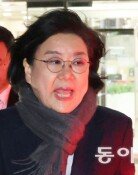51 Points for State Administration, 44 for Economic Policy
51 Points for State Administration, 44 for Economic Policy
Posted August. 22, 2005 03:11,
Nearly seven out of 10 Koreans, or 68.2 percent, think that President Roh Moo-hyun is not doing a good job with his state administration so far, half way through his term.
The results are from the latest of a series of joint surveys conducted by this paper and the Korea Research Center (KRC) on the presidents state administration since his inauguration in February 2003. The survey has shown the worst results to date.
This paper asked the KRC to conduct the survey on August 18, a week before the mid-point of Rohs presidential term on August 25. In this phone call survey, 1,000 adults nationwide were asked about what they thought of the presidents running of state affairs. Only 25 percent of the respondents approved of the presidents work.
When asked what score they would give the president on a scale of 0 to 100, the respondents gave the president an average of 51.1 points, which is lower than 53 points around the first anniversary this government and 55.9 on its second anniversary. In particular, the president scored a mere average of 43.6 points on economic policy operation.
The greatest number of respondents chose inter-Korean relations (20.4 percent) when asked the two areas of work the Roh government has been most successful in during the first half of the term. Abolishing authoritarianism followed with 17.7 percent and public participation and respect for public opinion with 9.4 percent.
Real estate policy (28.8 percent), price instability (26.4 percent), the widened gap between haves and have-nots (24.7 percent), and unemployment (23.6 percent) were most frequently mentioned in answer to the question asking two areas of work the government has failed in the most.
This implicates that the public takes economic failure very seriously. Similarly, economic recovery topped the list of two areas the president should place the highest priority on in the second half of his term, with 53.7 percent.
On the other hand, over half of the respondents, or 56.7 percent, opposed Rohs coalition proposal, despite the presidents repeated emphasis on the issue.
In terms of distrust toward those in power, Uri Party and Cheong Wa Dae presidential aides topped the list with 73 percent and 72.1 percent, respectively, followed by the administrative body with 64.1 percent, President Roh with 63.6 percent and Prime Minister Lee Hae-chan with 61.7 percent. Distrust in the Grand National Party (GNP) was 64.5 percent.
Former Prime Minister Goh Kun was the preferred choice of those surveyed to be the next presidential candidate with 35 percent, followed by GNP leader Park Geun-hye with 15.1 percent, Seoul Mayor Lee Myung-bak with 14.2 percent, and Unification Minister Chung Dong-young with 10.2 percent.
This survey has a sampling error of plus or minus 3.1 percentage points, with a confidence level of 95 percent. For more details, please visit www.donga.com.
Myoung-Gun Lee sunny60@donga.com gun43@donga.com





![“한동훈, 정치생명 걸고 무소속 출마해 평가받는 것 고려할만”[정치를 부탁해]](https://dimg.donga.com/c/138/175/90/1/wps/NEWS/IMAGE/2026/01/19/133186982.1.jpg)

